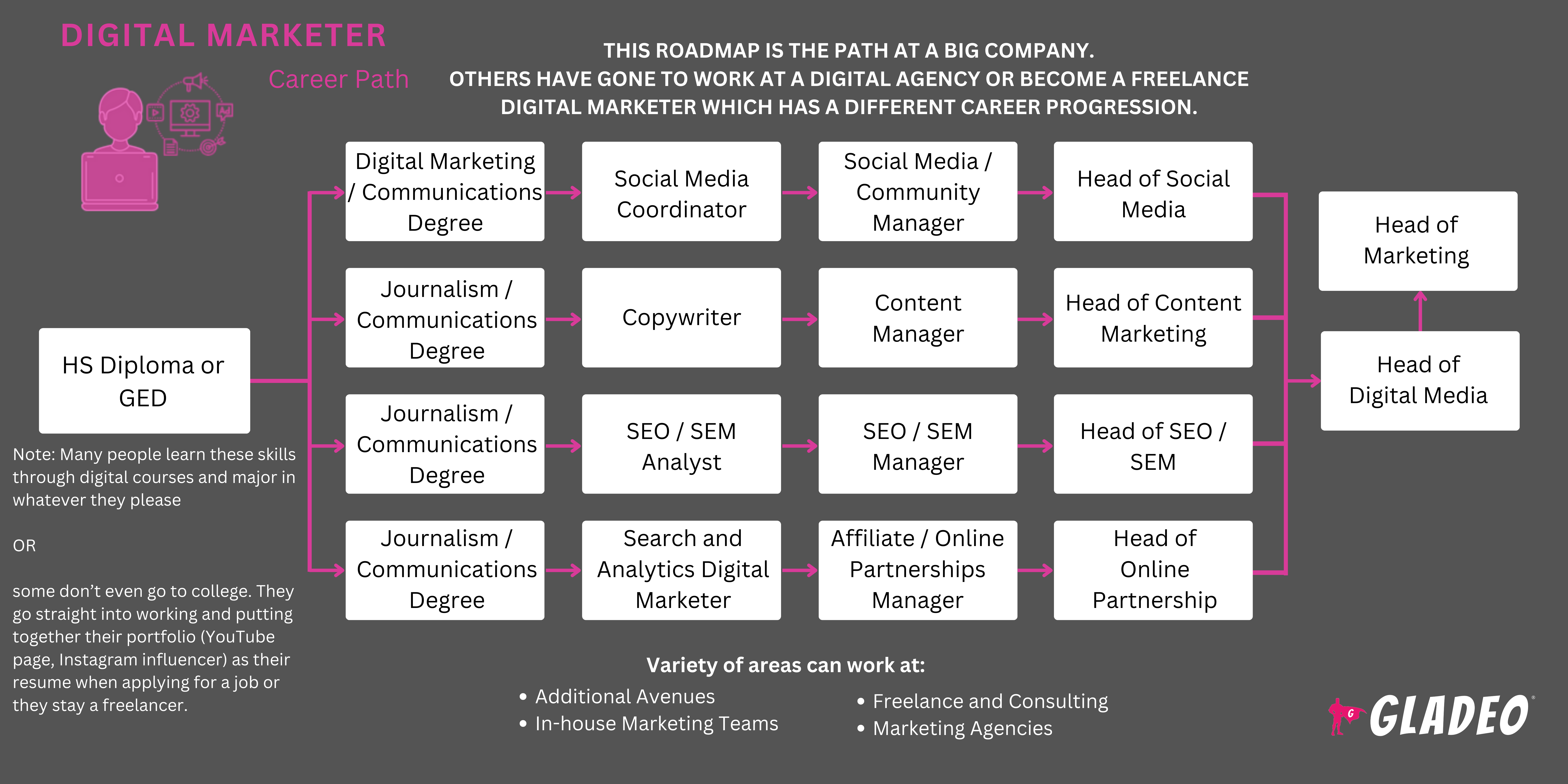스포트라이트
Digital Marketing Specialist, Digital Marketing Manager, Online Marketing Specialist, Digital Advertising Manager, Digital Campaign Manager, Social Media Marketer, SEO Specialist, Content Marketer, Email Marketing Specialist, PPC Specialist
Since the days of the Ancient Egyptians, humans have been marketing and advertising. But while our historical predecessors may have relied on papyrus posters, today, the Internet and the rise of mobile technology have created the concept of “digital marketing.” Putting a revolutionary new spin on a time-honored profession, Digital Marketers leverage all the capabilities that modern technology offers to change the game and reach customers virtually anywhere they go.
Television, radio, print, and billboard ads aren’t disappearing, but they have been put on the back burner to some extent as savvy companies turn increasingly to digital strategies. After all, why limit reach with an ad in a newspaper when you can target customers on their phones, following them around with ads sprinkled across every media platform they use? Digital Marketers know how to maximize such innovative opportunities while competing with each other for the attention, clicks, and hopeful conversation of viewers into paying shoppers.
- Spreading information about new products, services, and discount offers
- Boosting companies’ bottom lines through brand awareness campaigns
- Augmenting non-digital strategies with native mobile ads, geofencing/location-based marketing, and in-store touchpoints that work with social media apps
- Providing a more streamlined, omnichannel user experience
- Working with evolving mobile technologies and devising new tactics to leverage them
Working Schedule
- Digital Marketers may work full-time jobs at an agency or company, or on a part-time ad hoc basis for agencies or as a freelancer. Many part-time and freelance workers perform duties remotely from home or someplace other than their employers’ job site. Depending on employment conditions, hours may be highly flexible as long as targets and deadlines are met. In other words, some Digital Marketers choose their own hours and may be based anywhere in the world!
Typical Duties
- Work with clients, managers, sales teams, and developers as needed to decide on marketing strategies, directions, goals, and budgets
- Create customer avatars to better understand the psychology of potential eCommerce shoppers or audiences
- Decide upon different strategies for engaging Business-to-Business (B2C) versus Business-to-Customer (B2C) or other relationships
- Conduct market research into customer behavior and competitor products, services, and advertising
- Manage creative Social Media Marketing (SMM) campaigns for Instagram, Twitter, Facebook, LinkedIn, Snapchat, Pinterest, TikTok, Reddit, and other platforms
- Use analytic tools to target audiences; create paid ads and sponsored content aimed those audiences
- Offer free content while building up audiences (as subscribers or follows) to cultivate a pool to which you can market paid items (merchandise, courses, services, etc.)
- Partner with online influencers who can incorporate reviews of your goods or services into their own content
- Perform content marketing actions such as creating downloadable lead magnet material for website visitors in exchange for their email address
- Create blogs, articles, and other content that can be found online via Search Engine Optimization (SEO)
- Craft email marketing flowcharts for automated, timed campaigns
- Draft emails that address customers, or potential customers, at their specific point along the customer journey (from first encounter awareness phase until they decide to place an item in their shopping cart for purchase)
- Send follow-up emails for abandoned carts, as well as post-purchase messages that build the relationship and offer promotional discounts
- Buy Pay-per-click (PPC) ads that appear in search results and boost brand visibility
- Enhance passive website revenue by including affiliate marketing links or banner ads that redirect traffic to sites like Amazon (which provide commissions on items sold)
- Devise creative online ad campaigns or fundraising ventures that utilize an effective combination of visual elements, engaging copywriting, and video clips as applicable
추가 책임
- Optimize websites using Google Search Console tools
- Use plugin tools such as Yoast to assist with optimizing content for better discoverability
- Manage public relations by making it easy to post reviews, share content, and address concerns quickly and authentically
소프트 스킬
- Ability to work independently
- Able to generate ‘outside the box’ ideas
- Analytical
- Creative and artistic
- Effective communication skills, including active listening
- Informed social and cultural awareness
- Inquisitive
- Keen organizational skills
- Persuasive
- Resourceful
- Skills for coordinating activities
- Solid research skills
- Sound judgment and decision-making
- 팀워크
- Understanding of human motivational factors
기술 능력
- General familiarity with computers (PC or Apple)
- Microsoft Office, Google apps, Macintosh software
- Google Search Console
- Website-building tools (Wordpress.com, Wordpress.org, Squarespace, Weebly, Shopify, GoDaddy, Wix)
- Web hosting sites (Dreamhost, Bluehost, HostGator)
- Email marketing software (Constant Contact, Drip, SendinBlue)
- Collaboration tools (Slack, Trello, Flowdock, Monday)
- Analytical tools for social media and other sharing platforms such as Instagram, Twitter, Facebook, LinkedIn, Snapchat, Pinterest, TikTok, and Reddit
- Affiliate marketing programs such as Amazon Associates, Clickbank, and many more
- Digital Marketer; Overall knowledge of all digital marketing that needs to be implemented. Includes monitoring and analyzing the outcomes of the different campaigns.
- SEO marketer: Helps optimize your content so that search engines (like Google) likes to show the website as a top result for searches of a certain keyword.
- SEM marketer: Devises an advertising strategy that will bring a website to the top of both organic and paid search engines. Manages and tests their different marketing campaigns, using pay-per-click (PPC) advertising and doing keyword research. (i.e. Instagram, Facebook, Google advertising)
- Copywriting & Content Marketer: Responsible for the planning, creating and sharing of valuable content to attract and convert prospects into customers, and customer into repeat buyers.
- Email Marketer: Designs and writes email content. Creates and segments email lists. Nurtures leads and drives sales using compelling email.
- Social Media Marketer: Works on the overall social media strategies for a business or organization. Top platforms include: Facebook, Twitter, youTube, Pinterest, LinkedIn, Periscope, Tik Tok, Instagram. For more information, go to /career/social-media-specialist.
- Companies, both big and small
- Higher education institutions
- Governmental agencies
- Nonprofits
- Military recruitment
- Agencies
- Freelance
Digital Marketers are responsible for helping customers reach their goals, which are usually related to increasing sales of a product or service or boosting awareness of a cause. To do this most efficiently and cost-effectively, workers need to understand potential customers’ or users’ psychology and behavior. This requires in-depth research and keen insights. They must also know about competitor products and services, marketing strategies, and gaps or deficiencies that can be exploited.
After Digital Marketers know details about all of these variables, they must then work with customers to explore the best digital avenues for advertising. This demands an understanding of all the options, all the latest tech breakthroughs, and insights into current trend efficacy and investment returns. A lot can ride on one gamble, meaning the job can be stressful and one’s reputation put on the line!
When Digital Marketers don’t do their homework, campaigns can go wrong quickly if a brand’s marketing concept simply confuses people. Take International House of Pancake’s acronym IHOP, which they changed to IHOb on Twitter to generate buzz. To keep the mystery going, IHOP intentionally replaced the letter ‘p’ with ‘b’ in their replies to other Tweets. Alas, the campaign—meant to let customers know that they were serving burgers—fell flat as a pancake.
Other campaigns can come across as ‘tone deaf’ or insensitive to a particular group. Such missteps can go viral overnight, causing a backlash that impacts sales. Many edgy brands will openly clap-back or troll another brand for their mistakes, turning their competitor’s problem into an effective ad campaign for themselves. In the aftermath, customers are left taking sides and creating memes to mock the brand they least root for. Social media user behavior is not always predictable, but if brand campaigns don’t take occasional risks and are too bland, they lose out to edgier ideas floated by competitors.
Other trends include the rise in Artificial Intelligence, which predicts behavior by scanning Big Data for patterns. Companies are turning increasingly to smarter chatbots that can answer questions and prompt users to take certain actions. Modern customers have grown used to personalized experiences and do not appreciate generic advertising. They want tailored suggestions across multiple channels, whether it's a Netflix movie recommendation or a Facebook ad for a shirt with a slogan that magically seems to know their birth month.
Influencer marketing is a hot new tactic for personalization, as audiences can view a product or service demonstrated by someone they feel they have an established connection with. Essentially, the idea is that of a ‘trusted friend’ vouching for a ‘new friend.’ For instance, a user may have come to trust a YouTuber whose videos they subscribe to. So, they might be more apt to buy based on that influencer’s recommendation than a generic paid celebrity endorsement.
Many Digital Marketers grew up with the Internet and mobile technology and were comfortable using it as kids. They may have seen the ‘bigger picture’ early on, how social media platforms capture users then convert them into assets—massive pools of potential customers that third-party businesses access and sell to.
While the average social media user is peripherally aware of their status as a commodity, many are fascinated by the concept and dive into the ‘behind-the-scenes’ of how technology can enable organizations to influence user thinking and actions. But Digital Marketers are not only interested in the nexus of technology and psychology. They were also likely to have been highly creative kids, interested in graphic design and visual arts, persuasive writing, screenwriting, or even public speaking! They may have enjoyed serving in critical roles that help others get publicity or attention while they remain quietly in the background.
- Digital Marketers don’t always require a bachelor’s degree; it largely depends on who they want to work for
- Sizable employers may prefer to hire workers with a digital marketing degree, but some companies are just as interested in practical work experience
- A traditional business or marketing degree is helpful, but digital marketing requires distinct educational requirements
- A few examples of digital marketing classes (taken from various programs) include:
- Affiliate Marketing
- Applied Probability and Statistics
- Branding and Visual Marketing
- Content Marketing
- Cultural Studies and the Web
- Digital Marketing and Analytics
- Digital Media and Design
- Fundamentals of Public Relations
- Marketing Law and Contracts
- Search Engine Optimization
- Video and Mobile Marketing
- 3-18-month digital marketing bootcamps augment existing degrees or, in some cases, qualify applicants for roles that don’t require a degree
- A few of the many bootcamp options available:
- Boot Camp Digital
- BrainStation
- General Assembly
- Noble Desktop
- Wyncode
- Short stand-alone courses can enhance skills, such as:
- Coursera’s Strategy of Content Marketing
- Udemy’s Complete Digital Marketing Course
- edX’s Intro to Marketing Tools to Set Enterprises Apart
- Sign up for programs that focus on the digital aspects of marketing and not just traditional marketing practices
- Look for schools that offer flexible access, such as online or hybrid learning options
- Keep in mind that many workers may not require a bachelor’s degree, so you could be able to take sufficient college courses at a community college or vocational school (versus a full university, which has higher tuition rates and fees)
- Participate in extracurricular clubs or student groups that can help you network and practice relevant skills
- Review the school’s career assistance offerings to see if they can help you land a job after graduation
- Sign up for high school electives related to hard skills such as technology, business, coding, and accounting
- Polish soft skills by learning psychology, design, art, writing, and speaking
- Volunteer to assist your school with websites, social media management, email writing, video production, or other projects aimed at mass audiences
- Read blogs and watch videos related to digital marketing best practices
- Take short standalone courses or knock out some online digital marketing bootcamps (see our Education and Training Needed section for details)
- Decide which path you want to take on your career, so you can focus on either becoming an expert in a specific niche or applying yourself to learning broad concepts first
- Gain practical experience by experimenting with your own homemade website, social media channels, YouTube channel, etc.
- Learn by doing! Figure out how to build your brand, find which niches are underserved, explore ways to monetize content (if applicable) or promote your product or service, grow your audience, and establish trust and long-term B2B and B2C relationships
- Start freelancing to build your skills and garner client feedback
- Take advantage of resume writing or mock interview practice services provided by your school

- Know specifically what area of this broad field you want to work in, unless applying for a general position at a smaller company
- Complete as many relevant educational requirements as you can before applying
- Ensure you have the requisite skills and background listed on the job posting
- Ensure your resume and portfolio are clear, concise, and 100% free of typos and errors
- When writing about past experiences, make sure your resume lists hard statistics and data that offer analytic proof of results for school projects or personal brand campaigns
- For example, if you run a website and created ad campaigns, list the results of how they boosted traffic and increased clicks
- If you’ve done any freelance work, establish your portfolio and share a link to it
- Offer case studies of work you’ve done, listing the customers’ problem or goal and your creative measures to address it (and the results of those actions)
- Always ask for feedback from satisfied clients; reference or link to your testimonials in your portfolio
- Learn from past mistakes and critical feedback; be candid about your practical growth when speaking to potential employers
- Make an amazing first impression at interviews by polishing your skills in advance, studying potential questions and answers, and knowing the industry lingo
- Know which ladder you want to climb. Speak with your employer about growth opportunities and promotions, and learn the qualifications to get there
- Explore external opportunities, as well; sometimes, to climb, you have to switch ladders!
- If you are not working remotely, dress for success and make a positive impression (and if you work remotely, dress sharp for video meetings)
- As a marketer, much of your own credibility relies on your ability to market yourself and project an image of confidence and competence
- Continually UPSKILLING by learning new tricks, taking more bootcamps, more short courses, or by finishing your bachelor’s (if you didn’t already) or master’s in a relevant major
- Train and mentor others. Be a team player who demonstrates leadership potential, has visionary ideas, and knows how to persuade others and build consensus
- Take the initiative and become a master of your own brand, whether it is a company, a website, a YouTube channel, or something else. Digital Marketers understand that they have the power to create their own opportunities and grow their reputation (and income)!
웹 사이트
- American Association of Advertising Agencies
- HubSpot Academy
- Moz SEO Learning Center
- Neil Patel
- Search Engine Journal
- SEMRush
- Social Media Today
- Zest
도서
- Digital Marketing for Dummies, by Ryan Deiss and Russ Henneberry
- Dynamic Digital Marketing, by Dawn McGruer
- Hit Makers: The Science of Popularity in an Age of Digital Distraction, by Derek Thompson
- Invisible Influence: The Hidden Forces that Shape Behavior, by Jonah Berger
- The Road to Recognition, by Seth Price & Barry Feldman
- Top of Mind: Use Content to Unleash Your Influence and Engage Those Who Matter to You, by John Hall
- What Customers Crave: How to Create Relevant and Memorable Experiences at Every Touchpoint, by Nicholas J. Webb
Digital Marketing is the way of the future, which is why businesses are heavily investing resources into it. However, pre-existing fields haven’t faded away. For those who want to work in a more traditional environment, the Bureau of Labor Statistics offers several alternative career paths to consider, such as:
- Advertising Sales Agents
- Art Directors
- Editors
- Financial Managers
- Graphic Designers
- Market Research Analysts
- Public Relations and Fundraising Managers
- Sales Managers
Other ideas to think about, for those who do love the technology aspect of this field, include:
- Back-End, Front-End or Full-Stack Developer
- Computer and Information Systems Managers
- Computer Programmers
- Computer Systems Analysts
- Database Administrators
- DevOps
- Information Security Analysts
뉴스피드

주요 채용 정보

온라인 강좌 및 도구








